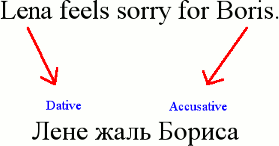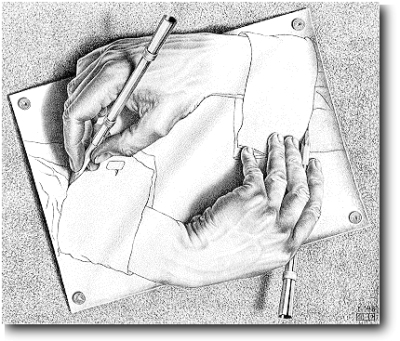Жаль (часть вторая)
The word жаль has several meanings, and today we will discuss its use in the sense of “to feel sorry for” a person. We English speakers have to do a grammatical backflip when dealing with the construction. In English the person who experiences the emotion is the subject of the verb, and the person pitied is the object of the preposition ‘for.’ In Russian the person who experiences the emotion appears in the dative case, and the person pitied appears in the accusative case:

Жаль sentences can be translated into English several ways:
| Лене жаль Бориса. | Lena feels sorry for Boris. or Lena feels bad for Boris. or Lena feels pity for Boris. |
| Мне жаль тебя. | I feel sorry for you. or I feel bad for you. or I feel pity for you. |
You will notice there is no verb in the sentences. To put them into the past tense, you add было; for the future, add будет:
| Лене было жаль Бориса | Lena felt sorry for Boris. or Lena felt bad for Boris. or Lena felt pity for Boris. |
| Лене будет жаль Бориса | Lena will feel sorry for Boris. or Lena will feel bad for Boris. or Lena will feel pity for Boris. |
Here you can see the phrase in more complicated sentences:
| Женя потерял ногу в Афганистане. Мне так жаль его, но не знаю, как я могу ему помочь. | Gene lost a leg in Afghanistan. I feel so sorry for him, but I don't know how I can help him. |
| На дворе стояла девочка, промокшая до костей от дождя. Бабушке было так жаль её, что она привела её в квартиру, переодела её в сухое платье, напоила горячим чаем и положила в постель. | There was a little girl standing out in the year, soaked to the skin from the rain. Grandma felt so sorry for her that she brought her into the apartment, put a dry dress on her, gave her hot tea to drink and then put her to bed. |
| Как ты можешь так со мной разговаривать? Разве тебе меня не жаль? | How can you say such things to me? Don't you feel sorry for me? |
| Вере было жаль Олега, потому что он никогда не испытывал родительскую ласку. | Vera felt sorry for Oleg because he had never experienced affection from his parents. |
Кухня
The busiest place the house I grew up in was always the kitchen. My mother is an amazing cook and I always spent a lot of time trying to learn and help. Today's word is кухня, kitchen.
| Sg | Pl | |
| Nom | кухня | кухни |
| Acc | кухню | кухни |
| Gen | кухни | кухонь |
| Pre | кухне | кухнях |
| Dat | кухне | кухням |
| Ins | кухней | кухнями |

Whenever we had gatherings,
Мама звала меня на кухню помочь.
Mom would call me into the kitchen to help.
My father also liked to take his turn at cooking.
Где папа? Он на кухне.
Where is dad? He is in the kitchen.
And now that I have my own house,
Самая большая комната в моём доме — кухня.
The biggest room in my house is the kitchen.
Which is exciting because I get to design it any way I want.
However, it is also overwhelming.
Существует огромное количество вариантов оформления кухонь!
There are a huge number of options for designing kitchens!

Приезжать/приехать
The verb pair приезжать/приехать is usually translated as “to arrive, come,” and it implies movement by vehicle. It conjugates like this:
| Imperfective | Perfective | |
| Infinitive | приезжать | приехать |
| Past | приезжал приезжала приезжало приезжали |
приехал приехала приехало приехали |
| Present | приезжаю приезжаешь приезжает приезжаем приезжаете приезжают |
No such thing as perfective present in Russian. |
| Future |
буду приезжать будешь приезжать будет приезжать будем приезжать будете приезжать будут приезжать |
приеду приедешь приедет приедем приедете приедут |
| Imperative | приезжай(те) | приезжай(те) |
In English we often use the preposition “at” with the verb “arrive,” so we have to bear in mind that for Russians arrival is a motion; that is, you complement the verb with either в/на + accusative or with к + dative:
| Профессор приехал в Москву в восемь часов утра. | The professor arrived in Moscow at eight o'clock. |
| Юля всегда приезжала на вокзал поздно. | Julie always arrived at the train station late. |
| Когда ты приедешь к нам? | When will you come to our place? |
One point of translation: in English if you see a vehicle approaching, you may say “Here comes the bus/train/taxi.” In Russian you will never use приезжать/приехать in that context. Instead you most commonly use the verb идти.
| Вот идёт поезд. | Here comes the train. |
| Посмотри, вот идёт такси. | Look, here comes the taxi. |
Рисовать/нарисовать

M.C. Escher-one of my favorites
Today's word of the day is the verb рисовать. This means to draw. As in a picture, not а lottery. I grew up loving to draw and doodle. So much, that I was often in trouble for drawing during all my classes.
| Imperfective | Perfective | |
| Infinitive | рисовать | нарисовать |
| Past | рисовал рисовала рисовало рисовали |
нарисовал нарисовала нарисовало нарисовали |
| Present | рисую рисуешь рисует рисуем рисуете рисуют |
No such thing as perfective present in Russian. |
| Future |
буду рисовать будешь рисовать будет рисовать будем рисовать будете рисовать будут рисовать |
нарисую нарисуешь нарисует нарисуем нарисуете нарисуют |
| Imperative | рисуй(те) | нарисуй(те) |
Here are some examples using our word:
Он рисует красивый цветок.
He is drawing a beautiful flower.
Я учусь рисовать.
I am learning to draw.
Я собираюсь наказать всех моих детей. Они рисовали на стене!
I am getting ready to punish all my kids. They drew all over the wall!

Катя, пожалуйста, нарисуй мне что-нибудь.
Katya, please draw me something.
Жаль (часть первая)
Sometimes in life you're just bummed out about something, and one of the words that expresses that idea in Russian is жаль. Жаль expresses an idea of sadness or regret or irritation; it can form an entire sentence unto itself:
| Жаль. | That's a shame. or That's a bummer. or |
If want to add the “what a” idea to it, you use как:
| Как жаль. | What a shame. or What a bummer. or |
Very often жаль is followed by a clause beginning with что:
- Жаль, что она не пришла.
- It's a shame that she didn't come. or
It's a pity that she didn't come. - Жаль, что ты так мало зарабатываешь.
- It's a pity that you earn so little. or
It's a shame that you earn so little.
If you want to incorporate the idea of who is experiencing the pity, then the person goes into the dative case. Once the person is added, though, it flows best if you don't use the words pity and shame in Engish translation. Instead other versions sound better:
- Мне жаль, что она не пришла.
- I'm disappointed that she didn't come. or
I'm sad that she didn't come. or
I'm bummed that she didn't come. or
I feel bad that she didn't come. - Лене жаль, что ты так мало зарабатываешь.
- Lena's sad that you earn so little. or
Lena's disappointed that you earn so little. or
Lena's bummed that you earn so little. or
Lena feels bad that you earn so little.
To put the жаль phrase into the past or future tense, use было and будет respectively:
| Мне было жаль, что она не пришла. | I was disappointed that she didn't come. |
| Мне будет жаль, если она не придёт. | I will be disappointed if she doesn't come. |
| Лене было жаль, что она не смогла встретиться с тобой. | Lena was disappointed that she couldn't get together with you. |
| Лене будет жаль, если ты ей не позвонишь. | Lena will be disappointed if you don't call her. |
<< 1 ... 43 44 45 ...46 ...47 48 49 ...50 ...51 52 53 ... 158 >>